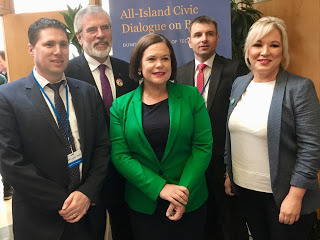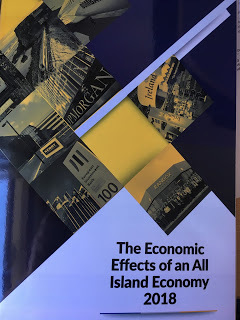A Ten Point Plan for Irish Unity
 Matt Carthy MEP; Gerry Adams TD; Mary Lou McDonald TD; Cllr Ruairi Ó Murchú; and Michelle O'Neill MLA at All-Island Civic Forum on Brexit in Dundalk on Monday April 30
Matt Carthy MEP; Gerry Adams TD; Mary Lou McDonald TD; Cllr Ruairi Ó Murchú; and Michelle O'Neill MLA at All-Island Civic Forum on Brexit in Dundalk on Monday April 30
There has been more written and speculated about the likelihood of achieving a United Ireland in recent years than in previous decades. What was once dismissed as fantasy is increasingly being discussed by academics, newspaper columnists and politicians as a real and viable outcome. Perhaps in a few short years, if we who support this objective approach it intelligently and in an inclusive way, and build support for an agreed Ireland and secure a referendum to end the Union.
Two weeks ago a report by one academic, Dr. Paul Nolan, stirred widespread public interest when he claimed that there will be more Catholics than Protestants in the North by 2021 – the centenary of the creation of the northern state.
Of course, as we all know the use of statistics to promote one opinion over another is an imperfect science. Consequently, great care must be applied when interpreting statistics or opinion polls. It would also be a mistake to presume that religious denomination defines political allegiance.There was widespread discussion about Nolan’s claims, including from some who point out that there are many citizens who don’t identify now with any religion. Thrown into this current debate were the additional stats which show that there are more Catholics of working age than Protestants, and more Catholic school children than Protestant. And so it goes on.
All of which ignores the fact that while once it might have been acceptable in the sectarian context of the northern state to equate Catholic with Nationalist, and Protestant with Unionist the increasing reality of life in this part of the island is that this is no longer necessarily true. However, we can get a sense of the shifting patterns in the north’s demographics if we look at the results from the 2011 census. It broke new ground by asking for the first time a question on identity.
Significantly, those who defined themselves as ‘British only’ were 48%. A far cry from the two thirds majority enjoyed by unionism almost 100 years ago. A quarter of respondents (25%) stated that they had an Irish only identity and just over a fifth (21%) had a northern Irish only identity. That means that 46% had some form of Irish only identity. Of course that doesn’t mean that they will all be rushing to vote in a referendum in support of Irish unity but it does reveal a significant shift in political demographics in the last 20 years.
This was given added weight in the Brexit referendum vote in 2016 in which 53% voted to remain within the EU, and the Assembly and Westminster results last year which saw the perpetual unionist majority in the north ended. All of this is evidence, in my view, of a thawing of the political iceberg which is the northern state.
So, what does this mean? For Irish republicans and other democrats, it means that there is everything to play for. That there are no fixed certainties in terms of people’s identity or how they might vote in a referendum on Irish unity. That means republicans need to pull together all of the arguments in favour of Irish unity – whether these be economic, rights based, cultural, social, historic and political. And we need to explain them, promote them, debate their merits with others and do all of this in a respectful manner.Last week an interesting report by Paul Gosling, a financial and economic commentator arrived on my desk in the Dáil. Entitled ‘The Economic Effects of an All Island Economy 2018’ the report brings together many of the recent positive arguments there have been made for Irish unity. It also includes a ten point plan setting out how Paul Gosling believes Irish reunification might be achieved.The plan argues for the continuation, on a gradually reducing basis, of the British subvention to the north; increased spending on capital projects; support from the European Union; the island of Ireland to be promoted as a single economy; a harmonised corporation tax regime and much more.
 The report warns of the dangers of Brexit. It quotes a leaked analysis from the British Treasury which concludes that the North will be severely and negatively affected by Brexit. A European Parliament report predicts a 3% reduction in the North’s Gross Domestic Product as a result of Brexit. All of which will lead to job losses. In the worst case scenario that could mean the loss of 100,000 jobs.Gosling points out that the agri-food sector is particularly at risk. There are over 29,000 farmers in the six counties with 87% of total farming incomes coming from the EU’s Single Farm Payment.Gosling’s report quotes from EY’s latest Economic Eye study. EY (Ernst & Young) is one of the "Big Four" accounting firms in the world. Gosling states that “while economic growth in the Republic last year was an estimated 4.9%, in Northern Ireland it was a mere 1.4%. Worse still, EY’s previous Economic Eye predicted that while the Republic will generate an additional 91,000 jobs by 2020 compared to 2016, the north will lose 3,500 jobs.”Concluding his report Paul Gosling states: “If Irish reunification is to be achieved, it has to be achieved by consensus. That means that the unionist population needs to be persuaded that reunification is in their collective best interests. At the heart of this would be the recognition that a genuine all-island economy would produce significant economic benefits for Northern Ireland, with more jobs and higher incomes generated… unionists would need to be convinced that their chosen identity would be respected and their relationship with Britain would be protected”.All of this makes common sense. Paul Gosling’s report; “The Economic Effects of an All Island Economy 2018” is a useful, informative contribution to the growing debate around a new and agreed Ireland. If you have the time check out his website at www.paulgosling.net where this report and much more is available.
The report warns of the dangers of Brexit. It quotes a leaked analysis from the British Treasury which concludes that the North will be severely and negatively affected by Brexit. A European Parliament report predicts a 3% reduction in the North’s Gross Domestic Product as a result of Brexit. All of which will lead to job losses. In the worst case scenario that could mean the loss of 100,000 jobs.Gosling points out that the agri-food sector is particularly at risk. There are over 29,000 farmers in the six counties with 87% of total farming incomes coming from the EU’s Single Farm Payment.Gosling’s report quotes from EY’s latest Economic Eye study. EY (Ernst & Young) is one of the "Big Four" accounting firms in the world. Gosling states that “while economic growth in the Republic last year was an estimated 4.9%, in Northern Ireland it was a mere 1.4%. Worse still, EY’s previous Economic Eye predicted that while the Republic will generate an additional 91,000 jobs by 2020 compared to 2016, the north will lose 3,500 jobs.”Concluding his report Paul Gosling states: “If Irish reunification is to be achieved, it has to be achieved by consensus. That means that the unionist population needs to be persuaded that reunification is in their collective best interests. At the heart of this would be the recognition that a genuine all-island economy would produce significant economic benefits for Northern Ireland, with more jobs and higher incomes generated… unionists would need to be convinced that their chosen identity would be respected and their relationship with Britain would be protected”.All of this makes common sense. Paul Gosling’s report; “The Economic Effects of an All Island Economy 2018” is a useful, informative contribution to the growing debate around a new and agreed Ireland. If you have the time check out his website at www.paulgosling.net where this report and much more is available.
Published on May 07, 2018 06:31
No comments have been added yet.
Gerry Adams's Blog
- Gerry Adams's profile
- 29 followers
Gerry Adams isn't a Goodreads Author
(yet),
but they
do have a blog,
so here are some recent posts imported from
their feed.



